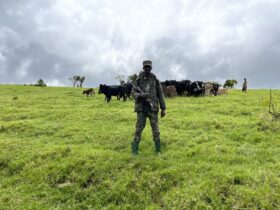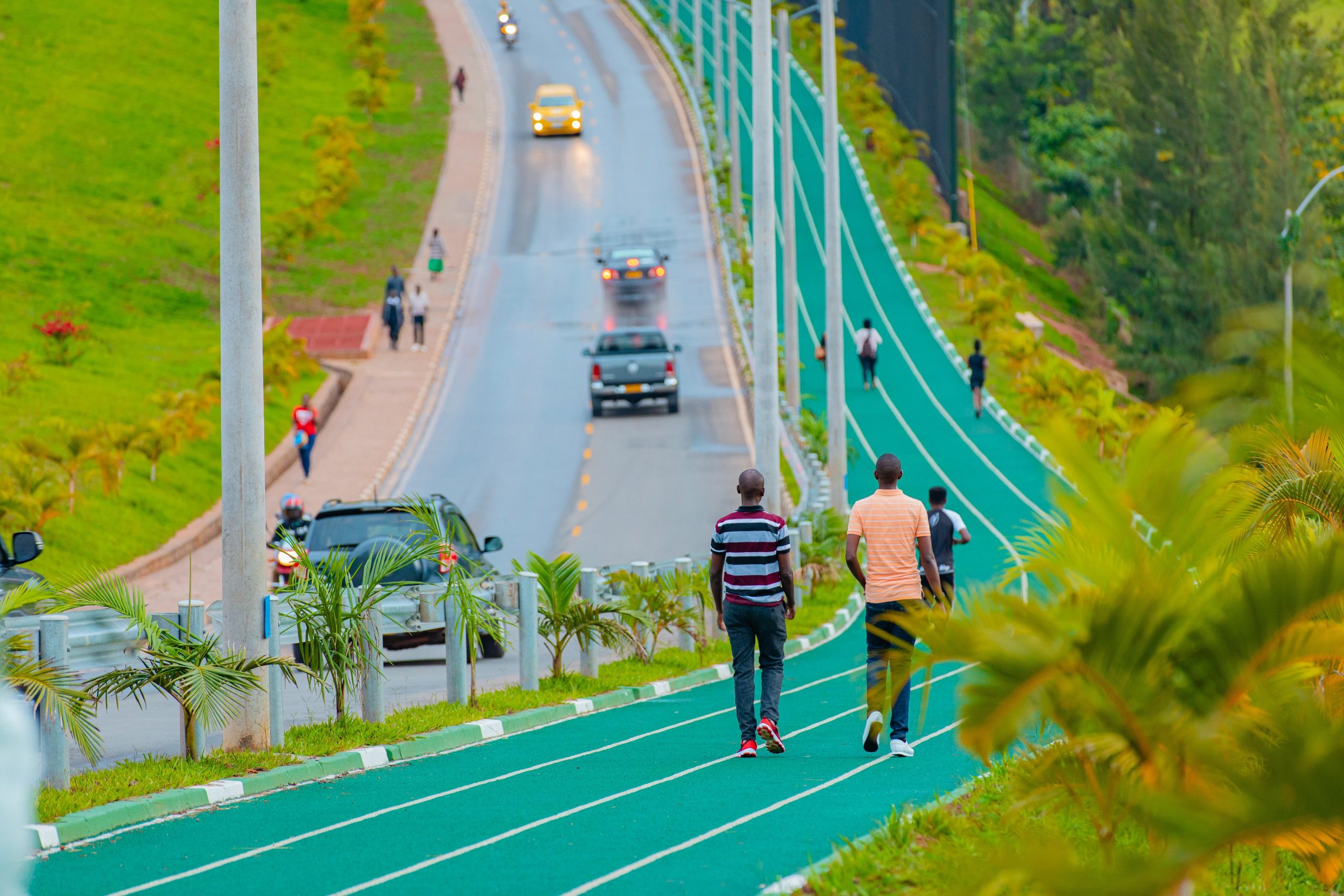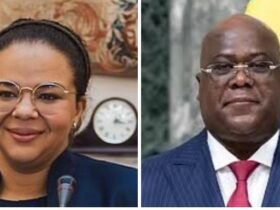A few weeks ago, Felix Tshisekedi’s confidant, Fortunat Biselele aka “Bifort”, briefly appeared in a video by Tshisekedi’s new spin doctor, Cameroonian Alain Foka (I’ll come back to him in a next article). A week later he was unceremoniously fired, then jailed for treason. As I write, Bifort is still in jail.
In the cameo, poor Biselele innocently explains that when Félix Tshisekedi came to power, he found that contracts signed by his predecessors with multinationals were benefiting individuals and choking his country’s economy. He then turned to regional big brother Paul Kagame and asked for his help to put him in touch with international investors.
 “Very well, your father was a good man!”, Kagame told him. He introduced him to his African counterparts, had him elected to the “Troika” of the African Union, preparing him to lead the Union the following year, got him invited to speak at the largest “Jewish lobby” convention in the world “AIPAC”, while he was still unknown; “We have to believe him”, president Kagame said of his new congolese protege.
“Very well, your father was a good man!”, Kagame told him. He introduced him to his African counterparts, had him elected to the “Troika” of the African Union, preparing him to lead the Union the following year, got him invited to speak at the largest “Jewish lobby” convention in the world “AIPAC”, while he was still unknown; “We have to believe him”, president Kagame said of his new congolese protege.
Fatshi was also invited to the CEO Forum in Kigali with his entire team in charge of investment promotion led by Jean Claude Kabongo, a.k.a JCK – powerful man in Kinshasa (also fired now), who made a captivating presentation on the immense potential of the great DRC, in front of investors from all over the world. I was in the room.
I remember with disappointment, that foreign investors were all interested in minerals, and when we met with Fatshi’s young team in an evening organized by “les Anciens du Zaire” at the famous Hotel des Milles Collines, I essentially said to them:
“be careful with these rapacious investors interested only in minerals with nothing for you. The DRC is a market of 90 million and human resources in equal measures; focus on them. The extractive industry is not labor intensive and you don’t have refining capacity in the country yet. If they want minerals, they should build processing plants first and refine everything in your country, I remember they weren’t so keen on my macro-economics analysis.
A few months later I would travel to Kinshasa twice to encourage Ukrainian investors to build a Coltan refinery there and took the opportunity to buy, with colleagues, a license to distribute fast moving products in DRC. I also hired and set-up a team in Kinshasa.
Rwandans continued to help their Congolese brethren, notably in structuring airtight contracts focused on the transfer of expertise, local processing, industrialization, market price control; basically a true Win-Win approach to Foreign Direct Investment (FDI). The idea was to establish investment standards in the DRC and in time, phase out the old exploitative contracts signed by Fatshi’s predecessors; there was no need for the Congolese to repeat mistakes that Rwanda had made in the past, at the inception of Rwanda Development Board (RDB). In all these projects, Fatshi’s advisor Fortunat Biselele was present.
In the meantime, the Congolese president had begun talks with the M23 rebels and concluded agreements that favored peace. Laurent Nkunda, Sultani Makenga and their relatives in refugees camps in Rwanda and Uganda were to peacefully return home to the DRC, and the FDLR was to disarm and return to Rwanda. The two heads of state, Kagame and Tshisekedi had pledged not to pursue the rebels once they had disarmed and been repatriated from either side, except for those who had committed crimes against Humanity. The FDLR leadership were already interned in a camp in DRC, waiting for a UN plane to return them to Rwanda; a law on the amnesty for M23 rebels was on the table in the Congolese parliament, waiting to be promulgated. An M23 delegation was invited to Kinshasa to finalize the integration of their movement in the Congolese army and political life; the war, for us on the shores of lake Kivu was over! A new era was on the horizon, Kinshasa and Kigali were about to do big things together and transform the region.
That’s when the old protagonists called Tshisekedi. I can’t confirm if Kabila was behind this, nor can I, the old guard who felt by-passed by the rapprochement, the over-ambitious new turks, etc. All I know is that they forced him to cut all ties with Paul Kagame! Felix Tshisekedi flipped overnight as though he had seen a ghost, or that some mafia cartel held captive his last born child.
His army FARDC resumed partnership with FDLR, attacked Rwandan territory, threw bombs on Rwandan soil, killed civilians and destroyed property. The rest, as the saying goes, is history… On this note, I will pause and tell you the story of the creation of OPEC: The Organization of Petroleum Exporting Countries, but especially the rise of Saudi Arabia and with it, all countries of the Gulf; a legendarily poor region living off camel herding, pilgrims visiting the holy city of Mecca, and the sale of deep-sea rubies to tourists.
1. Saudi Aramco: In 1933, Saudi Arabia granted Standard Oil of California (SoCal) exclusive rights for oil exploration in its eastern province. The Kingdom lacked basic infrastructure, money, and modern technology. At the time, oil was selling for less than $50 cents (0.5$) a barrel.
As soon as oil was discovered in March 1938, at a depth of 1,440 meters in the Dammam oilfield, the wells were fully owned by Americans. So was Saudi Aramco the company that was in charge of commercializing it. By 1973, Saudi Arabia asked for, and received a 25% share in the operations, and then discovered that it had been cheated on both oil costs and profits.
A year later the Kingdom increased its stake to 60%, before finalizing the complete buyout of the American shareholders by 1980. Today, Aramco pumps 10% of the world’s supply and makes an annual profit of $111billion, more than the combined net income of the five oil supermajors, and exactly double of the gross domestic product of the DRC.
2. OPEC creation and control of oil prices: OPEC was founded in 1960 on the initiative of the Shah of Iran, Mohammad Reza Pahlavi, the Saudi and Venezuelan Ministers of Hydrocarbons and Mines. The other countries would join later, as they continued to discover oil. At the time the price of oil was less than 5$ a barrel and wasn’t controlled by its producers.
In October 1973, OPEC decided to suspend oil production, in protest against the West’s support to Israel during the Yom Kippur war against a coalition of Arab countries led by Egypt and Syria.
In reality, the Gulf countries had been looking for an excuse to take control of their oil prices, and when production resumed, the price per barrel did not stop climbing, until it reached $30 in 1990. Between the 1960s and 1970s, OPEC successfully restructured the global oil production system so that decision-making authority and much of profits went in the coffers of oil-producing countries. The rise in oil prices, production and demand brought with it three decades of dazzling prosperity never seen to man, for ALL Gulf countries; today the richest in the world…
But why am I telling you all this? Today, consensus has emerged that fossil fuels (oil and gas) are harmful to the planet and must be replaced by renewable energy. For do this we need to mass produce batteries to store the green energy. Batteries and all the technology necessary to complete the ecological transition is made of the 3Ts (Tungsten, Tantalite, Tin), copper, but especially lithium! As it turns out, virtually a third of the world’s reserves of these minerals are found in the Democratic Republic of Congo. However, the world has never digested the 1973 oil crisis incident that led Gulf countries to take control of their own resources and prosper beyond measure.
So what is happening today in DRC? After falling out with Rwanda, the ambitious reforms were abandoned, the exploitative contracts are back in force, Chinese and other owners of huge mine concessions in DRC dish-out thousands of tons of earth, mud, sand and rock, ship them to their countries without even washing. Afterwards, they declare what they want to the Congolese ministry of mines.
Say for instance, one shipment on a Valemax bulk carrier – the largest vessel in the shipping world, also known as the Very Large Ore Carriers (VLOCs), measuring up to 400 meters in length with capacity of up to 400,000 deadweight tons (DWT), around 12,000 containers, a mine company in DRC can declare that they refined only 400 tons (10 containers) of Coltan, hide the real amount of extracted coltan, and swindle the lithium, gold, rare earth, and any other infinite multitude of precious minerals containing in the mud. The DRC would have absolutely no means of verification since the refining is done in China, Canada, South Africa, etc.
This is the kind of situation that Rwanda would never have allowed for our neighbors and brethren; this is the kind of contract that RDB would never have allowed J.C. Kabongo to sign; this is the kind of guidance that Kagame was providing Tshisekedi, and this: is the cause of the war and the suffering of Congolese Tutsi, and all peoples of Eastern DRC.
“Dark forces” as Fortunat Biselele termed them before going to jail, have managed to revive the anti-Tutsi sentiments within the Congolese public. Just before normalizing relations with Rwanda, the French army went into DRC forests to train and rearm the FDLR and set up an elite unit in their ranks called Commando of Research and Action in Profounder (CRAP).
One Denis Mukwege a village gynecologist, was named Nobel Prize winner, shot to stardom overnight, and funded to stir up anti-Tutsi hatred in South Kivu. And he is succeeding in this, since Banyamulenge in Uvira are being killed daily by local militias, as government and UN troops looks on, while the Hema people are massacred in Beni and Ituri.
These bad decisions by africans have played into the world’s hand, which is that DRC must never be close to Rwanda. Felix Tshisekedi must be insulated at all costs from typical Kagame’s “bad” advice to take control of his country’s destiny and resources.
Whether Felix Tshisekedi realizes now that he signed a pact with the devil, the situation is no longer in his hands as he faces highly contested, potentially chaotic presidential elections, late this year.
Conundrum:
- Tshisekedi’s DRC can’t really cuts ties with FDLR because FDLR is stronger than his army FARDC, MONUSCO and the East African force combined.
- FDLR is also so entangled with the civilian population of Eastern Congo that it is almost impossible to tell them apart when they aren’t fighting.
- Rwanda cannot rest while FDLR continues to recruit, train and rearm, just off its shores.
- M23 and Rwandophones cannot return if their villages in Eastern DRC are replete with hostile genocide perpetrators or their offspring.
- Elections cannot take place if parts of the country are occupied.
- Chaos will ensue across the DRC if elections are delayed or postponed
Tshisekedi’s desired solution:
To demand and receive international sanctions for Rwanda which would compel M23 to go back into refugee camps – as it was ten years ago.
- This solution is impossible because Rwandophone refugees demands’ are clearly legitimate; and DRC signed an agreement with them which it failed to implement.
- Violence targeting the Tutsi and Hema people is known to the entire world and the DRC government has no means of stopping it;
- Rwanda is strong in the international system to be easily sanctioned, especially with no clear evidence of wrongdoing and, while the world is preoccupied by the war Ukraine
Way out:
- For his own survival and that of his country, Tshisekedi must ask for Kagame’s help;
- The few FDLR figureheads, evangelists of genocide ideology against Tutsi must be separated from the majority population in Rutshuru, whom are also tired of war and are willing to live in peace – only M23 or Rwandan army have capability to achieve that;
- The second point takes care of the third and fourth;
- Once Kivu is secured, there will be no reason to postpone elections; none at all for chaos.















Well analysed and articulated article! Congratulations GATETE, well done.
Thank you very much nailing to the point the cause of endemic instability not only in DRC but in the whole of Africa. We Africans must wake up and defend our interests. Its a pity that our Congolese brothers are unable to logically identify the cause of their misery.
A very informative post. Well-done. No surprise as to who is training FDLR. CRAP lol. All we can do is hope the meddling of foreign forces doesnt get deeper hopefully they cant without being right out front. Who else would it be to use 30 year old ethnic division politics that Rwanda doesnt even use anymore. Smdh.
Even if the article was to be translated in French, I have my doubts on how the congolese opinion would receive it without distortion.
It is still worth trying
Good analysis Gatete
This is a catch22 situation and is similar the lion snake crocodile tree cutter man…. the solution is beyond man to devise. The second best thing is for M23 to continue pounding them and stopping genocide of the Tutsi. As for the Hema, their lives will be paid for by Uganda; the passive spectator who has refused to help though able physically financially morally and responsibly.
Thank you Gatete for your informative article
Don’t retire Plse, we need your informative blogs.
Well pointed out. Other African countries should pick lessons from this; otherwise, conflicts fueled by dependence syndrome will continue to reign in unfocused African leaders.
Tishekedi is mislead by his cabinet who seek to be in power next year with election fever rising.after years of incompetency with nothing to show for the fed-up citizens fed with propaganda daily about Rwanda affecting their service delivery to those who elected them.fighting M23 is the only hope that remains to show they are acting responsibly, where there are no roads,no water
Tshisekedi was miss led by his entourage plus some foreign countries.
Gatete please don’t retire keep posting I really enjoy your analysis.
Many tweets here are from people I suspect to be FDLR because you have explained as it is and the reason for M23 to be in Kivu.It is not Tshekedi but FDLR who are in control and want to use Kivu to gain back power in Kigali.We will keep pushing for our brothers to understand that M23 are Congolese citizens,God bless you bro.
This is a very well written and from an unbiased position. In my opinion Fatshi is already knee-deep in the trenches he dug for himself and, sadly for the DRC people. When one sow hatred, hatred will he reap. The only sensible solution is for Fatshi and the pathetic Mukwege to use the same fervor to reverse the racism and genocide ideologies by a robust campaign for peace. He has to divorce from FDLR by allowing Rwanda to deploy the much capable and willing RWANDAN FORCE-to part of the Regional Peace Making Force (You can’t keep something which doesn’t exist) there is no peace in the region to be kept~ make it first by concret actions by disarmament and dismantling the trouble makers such as FDLR and all the allies; legitimizing M23 by implementing the agreements signed, and arresting anyone who would continue to attack the Tutsis and any Kinyarwanda speaking individuals anywhere in DRC. In a nutshell, DRC population under the direction of their president have the sole responsibility to restore peace and to build their nation. This include the M23 families as they are CONGOLESE at the same level as the Bakongo, and the thousands Congolese speaking other dialects. If Fatshi doesn’t act swiftly, he risks being swallowed by the monster he created. Rwanda will defend herself, and all the Tutsis in the world, their associations, and sympathetic friends of the Tutsis will not stay idle watching and waiting for another genocide to continue unchecked.